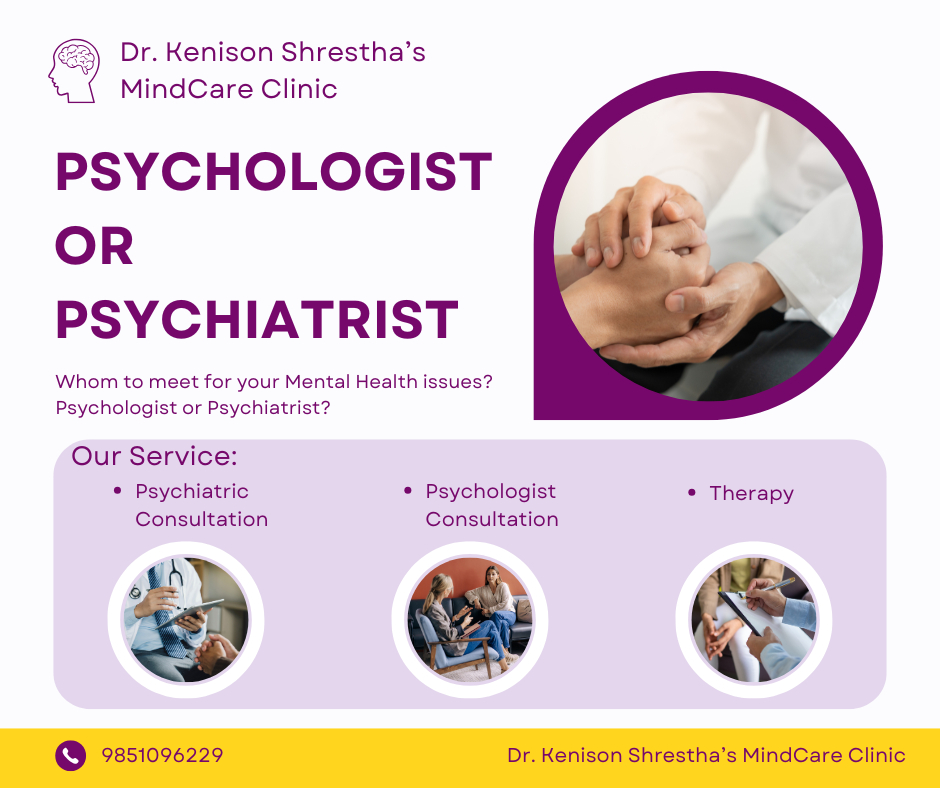11. Psychologist or Psychiatrist: Psychiatry and Psychology- What are the differences?
Psychologist or Psychiatrist

The fields of psychology and psychiatry both deal with the study and management of mental health issues. Finding the right mental health professional can be difficult. The terms “psychologist” and “psychiatrist” are often used interchangeably. However, they represent different professions and one easily gets confused. Both are valuable in the field of mental health, but they have distinct approaches and areas of expertise. This blog post, written in collaboration with Dr. Kenison Shrestha, a practicing psychiatrist in Nepal, will break down the key differences between psychologists and psychiatrists to help you navigate your mental health journey.
Training and Education
Educational backgrounds are one of the key differences between psychologists and psychiatrists.
Psychiatrists: They are medical doctors (MDs) who have completed at least 8 years of rigorous training. This includes 5 and half years of medical school, followed by a residency specializing in psychiatry (usually 3 years). This extensive training helps them with a deep understanding of the biological basis of mental health and the ability to diagnose and treat mental illness using medications.
Psychologists: Psychologists must earn a bachelor’s degree, a master’s degree, and a doctoral degree in psychology and supervised clinical experience. Their education focuses on the mind, emotions,s, and behaviors. Unlike psychiatrists, psychologists are not medical doctors and cannot prescribe medication.
Treatment Approaches
Both psychologists and psychiatrists play vital roles in promoting mental well-being but their treatment approaches often differ.
Psychiatrists: As medical doctors, psychiatrists can prescribe medication to manage symptoms of mental health conditions like anxiety, depression, bipolar disorder, obsessive-compulsive disorder, and schizophrenia. For stabilizing moods, reducing emotional distress, and improving overall functioning, medication can be a powerful tool. They may also provide psychotherapy (talk therapy) but often focus on medication management.
Psychologists: They primarily use psychotherapy to help individuals develop coping mechanisms, and address negative thought patterns. This therapy includes cognitive behavioral therapy (CBT), interpersonal therapy, and psycho-dynamic therapy.
Treatment Offered by Psychologist or Psychiatrist
The types of conditions typically treated by psychologists and psychiatrists can also differ.
Psychiatrists: They help in treating severe and complex mental health disorders that require medication management. The conditions include schizophrenia, bipolar disorder, major depressive disorder, anxiety disorder, obsessive-compulsive disorder, panic disorder, and addiction.
Psychologists: They often provide support for individuals dealing with stress, grief, trauma, and life transitions as well as mild forms of anxiety and depression.
Working Together
In many cases, both psychologists and psychiatrists work collaboratively to provide comprehensive mental health care. A psychiatrist might prescribe medication to manage core symptoms, while a psychologist helps individuals develop coping skills. The collaborative approach can lead to more effective and long-lasting treatment outcomes.
Who should you see? Psychologist or Psychiatrist?
The best mental health professional for you depends on your requirements and preferences. Here are some tips to help you decide:
See a psychiatrist if:
- You are experiencing severe or complex mental illness.
- You have tried therapy without significant improvement.
- You require medication management.
See a psychologist if:
- You want to improve your coping skills.
- You are looking for talk therapy to address your emotions.
- You are dealing with mild anxiety, depression, or other concerns.
Finding The Right Professional In Nepal
Confused about Psychologist or Psychiatrist?
Mental health awareness is growing in Nepal, and there are a growing number of qualified psychiatrists and psychologists available. The decision for making an appointment depends on your requirement and severity of the condition you have. We hope this article will help you decide about the mental health professionals for your mental health condition.
Here are some resources to help you find a mental health professional:
